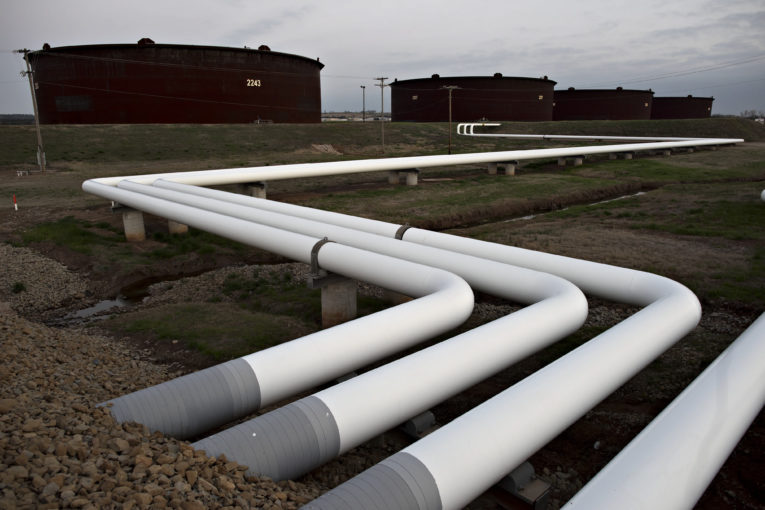
CALGARY — Canadian Natural Resources Ltd. criticized how pipeline giant Enbridge Inc. operates its Mainline network, blasting the country’s “dysfunctional” oil export system in an earnings call Thursday and demanding changes.
Canadian Natural is the country’s largest oil and gas producer by volume and president Tim McKay sharply criticized the system that’s currently in place for shipping oil out of Canada on pipeline giant Enbridge Inc.’s mainline pipeline network — which is the biggest and most critical artery for exporting Canadian oil.
“We have to fix the nomination system,” McKay said, noting that last December, more than 13 million barrels of oil were nominated onto the system but the total amount of oil supply available for export was 5.4 million barrels.
The mainline, which consists of multiple oil pipelines including the delayed Line 3 replacement project through Minnesota, has the capacity to move 2.85 million barrels per day out of Western Canada.
Unlike most other pipelines that operate under long-term contracts, the Enbridge mainline operates under a nomination process. Each month, producers and refiners nominate barrels to move in the pipes but as new pipeline projects have stalled amid rising production, companies are nominating for extra space as demand on the system rises.
“The key point here is that a real barrel produced in Alberta needs to have equal access into the market and, you know, with the current system where you can nominate double-time what are actually real barrels, the air barrels have to come out of the system,” McKay said.
Air barrels result from oil companies or traders booking more pipeline space than they physically need, so that pipelines are not full even when more oil is being produced than the network can accommodate.
Reuters reported this week that Enbridge has asked oil producers to commit to eight-year terms on the mainline as it moves from a nomination system to a more traditional system that runs on contracted space. The need for the move has been exacerbated by delays to new pipeline projects and as Canadian oil production exceeds what current pipelines can export.
“The Enbridge Mainline system is operationally full. There is no material capacity to be gained by changing the apportionment and supply verification procedures,” Enbridge spokesperson Jesse Semko said in an email.
“Over the past year, Enbridge has worked extensively with industry members on potential changes related to Enbridge’s apportionment procedures. These efforts resulted in no consensus among shippers on any potential changes,” Seiko said, adding that work is ongoing.
Enbridge chief executive Al Monaco also addressed the issue at his company’s annual shareholders meeting on Wednesday but declined to discuss whether or not customers were being asked to sign eight-year contracts for space on a reconfigured system.
“We’re in discussions right now in terms of making an offer to our customers with respect to priority access on our mainline,” Monaco said.
“From the very beginning we’ve taken the position that we are responding to what our customers are asking for. What they’re asking for is toll certainty. What they’re asking for is certainty on getting access to the pipe on a continuous basis. That’s the spirit on how we’re designing our commercial structure,” Monaco said.
Canadian Natural, which produces over one million barrels of oil equivalent per day, considers fixing the system to be “one of the first priorities” for lifting Canadian heavy oil prices, McKay said.
“Canadian Natural will be working with the Alberta government, regulators and industry to try to improve the system. A common sense solution does exist to the address the dysfunctional current system,” McKay said.
The company’s shares rose roughly 1 per cent following the company’s earnings release Thursday which contained “no big surprises,” according to a research note from Raymond James analyst Chris Cox.
The company reported net earning of $961 million in the first quarter, which is up 64 per cent from $583 million in the same period a year earlier.
It’s also a full inversion from the company’s fortunes from the final quarter of 2018 when discounts for heavy Canadian oil hit record highs and Canadian Natural reported a $776 million net loss.
McKay praised the Alberta government’s decision to force local oil producers to scale back their oil output at the end of 2018 in a bid to lift domestic prices.
“The outcome of this decision has been very positive for all Albertans, Alberta producers and the benefits are widely distributed across the country through jobs, taxes, royalties and equalization payments that without curtailment there would have been significant job losses,” McKay said.
• Email: [email protected] | Twitter: geoffreymorgan
You can read more of the news on source
